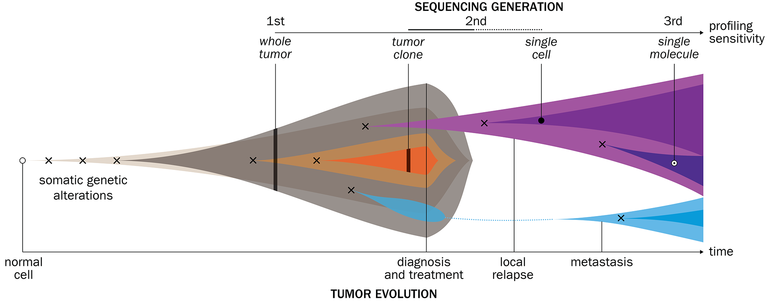How is gene science applied to cancer?
Despite remarkable progress in treating and curing some forms of the disease, cancer is still the leading cause of death in Canada. This situation drives cancer researchers internationally to understand why and how cancers form, spread, and become resistant to treatment, in their effort to work towards improved prevention and better outcomes for people with cancer.
Since the early 1990s, cancer researchers have turned their attention to tackling cancer at its source, i.e. changes to the DNA that makes up our genome. Scientists are learning experimentally how to "turn off" the genes that drive cancer growth, and "turn on" our body's best defenses against cancer. This is the goal of cancer researchers in gene science: a world safe from the fear of cancer.
There are hundreds of human genes that have the potential to cause malignancy. In some cases they are inherited and in other cases, they are dormant until "turned on" by an environmental trigger such as smoking, a high-fat diet, or a virus.
Cancer starts as a genetic change in one cell. A healthy cell will undergo a number of genetic (mutations in specific genes) or epigenetic changes (such as) before becoming a pre-cancerous and then a cancerous cell. Unless checked by the body's own defenses, that one cell can grow over weeks, months, or even years into a cancer tumour. The malignant tumour can then shed daughter cells, also containing the damaged genes, which can travel through the body's lymph system. These cells in turn "seed" and grow into new tumours, a process called metastasis. Understanding the exact genetic processes at each of these changes is the focus of genome sequencing in cancer research.

The analysis of tumour samples also allows us to pinpoint genomic changes that create vulnerabilities in the cancer cells that can be specifically targeted using drug treatments, potentially stopping or reversing tumour growth.
The standard therapies of surgery, radiation and chemotherapy have proven extremely successful in a variety of cancers, such as Hodgkin's disease, some childhood leukemias, early-stage leukemias and early-stage colorectal cancer. Even when these treatments cannot cure cancer, they extend and improve the quality of life for many patients. However, eliminating the cancer cell before it spreads through the body, before it grows into a tumour, or even earlier, is the ultimate goal of cancer genome research.
Genetic research in cancer includes:
- Pinpointing which anti-cancer drugs will work best against specific forms of cancer in individual patients;
- Finding genetic "on/off" switches in the cell's cancer processes;
- Devising genetic screens to identify individuals at high risk of cancer;
- Creating vaccines or viral messengers to arm the immune system against cancerous cells at an early stage;
- Developing drugs and highly specialized radiation techniques targeted to early stages of cancer growth, to stop it in its tracks and prevent disease growth;
- Predicting disease progression (i.e. aggressiveness of the cancer) from initial biopsy samples.
The Genome Sciences Centre continues to forge partnerships with other leading laboratories within British Columbia, across Canada, and around the world. The Genome Sciences Centre is a resource available to the BC Cancer Research Centre's world-renowned senior scientists, who research cancers of the lung, prostate, breast, skin, cervix and lymph system, cancers of the blood (leukemia), and many others. Working closely with colleagues at the BC Cancer Agency, senior scientists at the Genome Sciences Centre continue to utilize state-of-the-art technologies as they chart the genes of cancer processes, improving the effectiveness of current treatments and the paths toward cures for specific cancers. The ultimate goal is to find effective means of preventing cancers.
